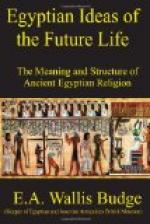So far we have seen that in heaven and in the world beyond the grave the deceased has found only divine beings, and the doubles, and the souls, and the spirits, and the spiritual bodies of the blessed; but no reference has been made to the possibility of the dead recognizing each other, or being able to continue the friendships or relationships which they had when upon earth. In the Sekhet-Aaru the case is, however, different, for there we have reason to believe relationships were recognized and rejoiced in. Thus in Chapter LII. of the Book of the Dead, which was composed with the idea of the deceased, from lack of proper food in the underworld, being obliged to eat filth, [Footnote: This idea is a survival of prehistoric times, when it was thought that if the proper sepulchral meals were not deposited at regular intervals where the KA, or “double,” of the deceased could get at them it would be obliged to wander about and pick up whatever it might find to eat upon its road.] and with the object of preventing such an awful thing, the deceased says: “That which is an abomination unto me, that which is an abomination unto me, let me not eat. That which is an abomination unto me, that which is an abomination unto me, is filth; let me not be obliged to eat thereof in the place of the sepulchral cakes which are offered unto the KAU (i.e., “doubles"). Let it not touch my body, let me not be obliged to hold it in my hands; and let me not be compelled to tread thereon in my sandals.”
Some being or beings, probably the gods, then ask him, “What, now, wilt thou live upon in the presence of the gods?” And he replies, “Let food come to me from the place of food, and let me live upon the seven loaves of bread which shall be brought as food before Horus, and upon the bread which is brought before Thoth. And when the gods shall say unto me, ‘What manner of food wouldst thou have given unto thee?’ I will reply, ’Let me eat my food under the sycamore tree of my lady, the goddess Hathor, and let my times be among the divine beings who have alighted thereon. Let me have the power to order my own fields in Tattu (Busiris), and my own growing crops in Annu. Let me live upon bread made of white grain, and let my beer be made from red grain, and may the persons of my father and mother be given unto me as guardians of my door, and for the ordering of my homestead. Let me be sound and strong, and let me have much room wherein to move, and let me be able to sit wheresoever I please.”




